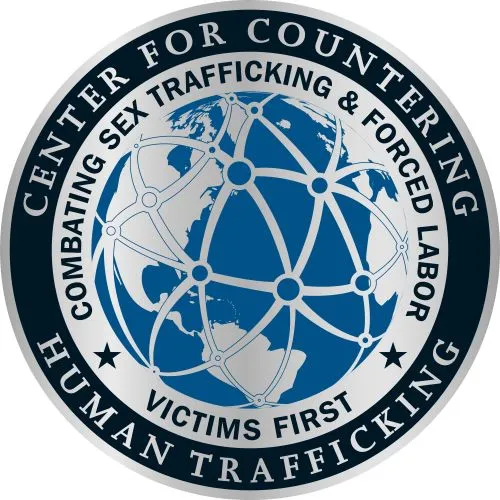 The mission of the Department of Homeland Security’s (DHS) Center for Countering Human Trafficking (CCHT) is to advance counter human trafficking law enforcement operations, protect victims, and enhance prevention efforts by aligning DHS’s capabilities and expertise. The CCHT is a DHS-wide effort comprised of 16 supporting offices and components and is led by U.S. Immigration and Customs Enforcement (ICE) Homeland Security Investigations (HSI). The CCHT is the first unified, inter-component coordination center for countering human trafficking and the importation of goods produced with forced labor.
The mission of the Department of Homeland Security’s (DHS) Center for Countering Human Trafficking (CCHT) is to advance counter human trafficking law enforcement operations, protect victims, and enhance prevention efforts by aligning DHS’s capabilities and expertise. The CCHT is a DHS-wide effort comprised of 16 supporting offices and components and is led by U.S. Immigration and Customs Enforcement (ICE) Homeland Security Investigations (HSI). The CCHT is the first unified, inter-component coordination center for countering human trafficking and the importation of goods produced with forced labor.
Guided by the DHS Strategy to Combat Human Trafficking, the Importation of Goods Produced with Forced Labor, and Child Sexual Exploitation, CCHT integrates the efforts of every component within DHS involved in combating human trafficking. DHS efforts range across criminal investigations, victim assistance, identifying and reporting human trafficking, external outreach, intelligence, and training. The CCHT better equips and positions DHS to accomplish and improve every aspect of its counter human trafficking efforts.
The CCHT supports all of DHS by leveraging its subject matter experts to:
- Drive criminal investigations of forced labor and sex trafficking through coordinated intelligence and evidence-based strategies.
- Seek improvements to delivery of victim protections, including victim-based immigration benefits, a national Continued Presence program for law enforcement, and robust identification.
- Increase human trafficking victim identification through training, nationwide public awareness, and screening tools.
- Incorporate proven and promising victim-centered practices into DHS policies and protocols.
- Strengthen trade enforcement against the importation of goods produced with forced labor.
- Assist procurement implementation and enforcement efforts to prevent and deter human trafficking in DHS acquisitions and contracts.
The CCHT produces an annual report, the DHS Countering Human Trafficking Year in Review, which details advancements made by DHS and the CCHT during the previous fiscal year to identify and screen for human trafficking; offer protection and assistance to victims; conduct criminal investigations; enforce laws related to the importation of goods produced with forced labor; and conduct training, outreach and engagement. Read the latest report.
The victim-centered approach seeks to minimize additional trauma, mitigate undue penalization, and stabilize and support victims. In doing so, it encourages survivors to participate actively in investigations, enabling law enforcement to better detect, investigate, and prosecute perpetrators. Additionally, DHS Secretary Mayorkas has directed DHS components to incorporate a victim-centered approach into all policies, programs, and activities governing DHS interactions with victims of crime.
Continued Presence
Continued Presence is a temporary immigration designation provided to individuals identified by law enforcement as trafficking victims who may be potential witnesses. CP allows trafficking victims to lawfully remain in the U.S. temporarily and work during the investigation into the human trafficking-related crimes committed against them and during any civil action under 18 U.S.C. § 1595 filed by the victims against their traffickers. CP not only authorizes the victim to remain in the United States for two years and is renewable but also provides a free work permit and eligibility for other federal benefits and services.
In the earliest stages of an investigation, Continued Presence is the best vehicle for federal, state and local law enforcement to obtain temporary and quick legal immigration protection for trafficking victims. This combination of protections stabilizes victims, restores self-sufficiency and improves their ability to assist law enforcement.
The CCHT processes all Continued Presence (CP) applications for federal, state and local law enforcement nationwide. For direct assistance from the CCHT regarding Continued Presence, please email: ContinuedPresence@ccht.dhs.gov.
Additional Information
Please review additional resources below to learn more about the ways DHS uses a victim-centered approach.
The CCHT hosts webinars to advance DHS’s counter-trafficking mission, to raise awareness of efforts taking place across the Department, and to promote promising practices.
Law Enforcement
The CCHT will host its Continued Presence Webinar for Law Enforcement on:
July 18, 2024, 3:30-4:30 EST
Register for this event: CCHT Continued Presence Webinar for Law Enforcement Personnel.
Learn more about the CCHT’s quarterly Continued Presence Webinars series for federal, state, local, tribal, and territorial law enforcement partners.
Public
CCHT hosts a Continued Presence Webinar series for non-governmental organizations, service providers and the general public.
This webinar series focuses on:
- What Continued Presence is and who is eligible to make a request
- Who to contact to make a Continued Presence request
- The Continued Presence Resource Guide
- The CCHT Victim-Centered Approach
- Continued Presence applications in support of civil action
- Recent improvements to the Continued Presence program
The next Continued Presence Spanish Language Webinar will be held on July 24, 2024.
The next Continued Presence Public Webinar will be held on July 30, 2024.
- CCHT Overview
- 2023 Fact Sheet: DHS Efforts to Combat Human Trafficking
- DHS Strategy to Combat Human Trafficking, the Importation of Goods Produced with Forced Labor, and Child Sexual Exploitation
- Forced Labor Enforcement Task Force Timelines Report
- Criminal authorities for enforcing against forced labor in China Fact Sheet
- CIS Ombudsman’s Webinar Series on How DHS Combats Human Trafficking and Forced Labor in Imported Goods
- Learn more about U.S. Customs and Border Protection (CBP)’s efforts to counter forced labor in the supply chain
- Learn more about U.S. Citizenship and Immigration Services’ (USCIS) the first-ever standalone T-Visa Resource Guide for law enforcement and certifying agencies
- CCHT partners with the DHS Blue Campaign. Learn more about Blue Campaign and sign up for the Center for Countering Human Trafficking Chronicle (formerly Blue Campaign newsletter) to regularly receive Campaign news, information about upcoming events, and ready-to-use social media content.
